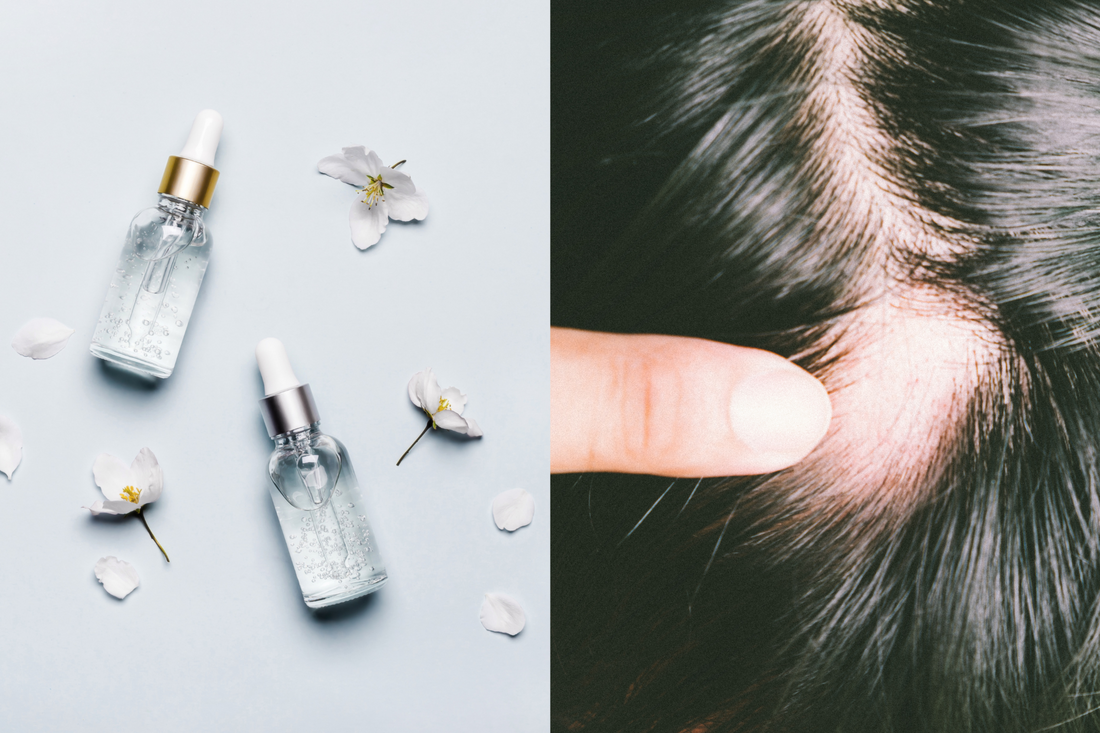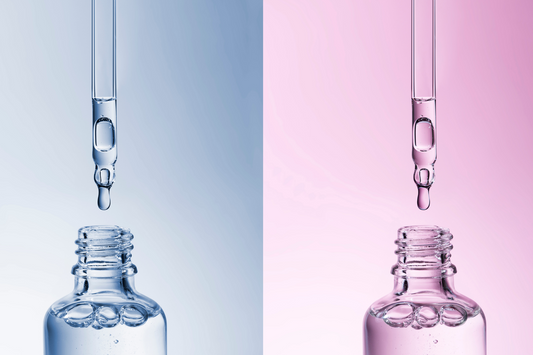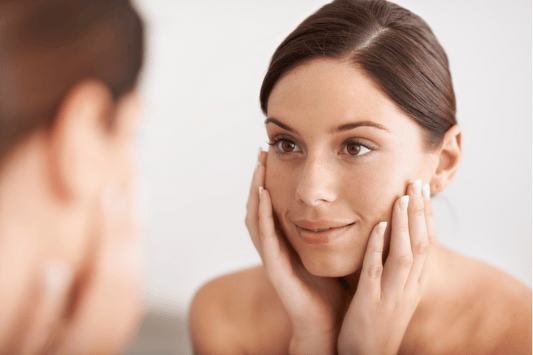Experiencing hair loss and hair thinning is hard. People experiencing these conditions may find themselves down a rabbit hole trying to figure out the main cause of their changing appearance. It is very possible they may have come across some obscure online forum claiming that the cause of their hair loss is retinol.
In this blog article, we break down if there’s any truth to the question “can retinol cause hair loss?”.
What is Retinol? What are Retinoids?
You’ve probably come across retinol and retinoids in skincare products such as lotions, creams, and gels. These ingredients were originally used to treat acne, but in recent years have exploded in popularity as a cosmetic ingredient for their anti-wrinkle and anti-aging properties. Everyone loves retinol, but what’s the difference between retinol/retinal, and retinoids?
The tricky thing is, retinols don’t represent any single ingredient, but it is rather an umbrella term representing cosmetic ingredients, over-the-counter drugs, and prescription retinoids. These are all different forms of vitamin A. By stimulating skin cells to produce collagen, they can treat fine lines and wrinkles, reduce redness and hyperpigmentation, and provide skin hydration, in addition to their acne-fighting abilities!
Hair loss from retinol?
What about hair loss? Can retinol cause hair loss? Deep in the interwebs are several anecdotal reports from individuals who have experienced changes in hair texture, hair shedding, and hair loss. One reddit user described: “I have been on tret [tretinoin] for like 3 years now and have loved it and not wanted to discontinue use. About 2 and half years ago I started shedding amd insane amount of hair. I have always had not normal thick but insane thick hair, if it wasn't for this I believe I would have severe balding issues now”.
Let’s take a step back and discuss the clinical evidence for retinol causing hair loss.
What is the clinical evidence behind retinol causing hair loss?
Well, as a matter of fact, there is not a lot of clinical evidence demonstrating that retinol or retinoids (including tretinoin / retin-a, adapalene, differin, etc.) causes hair loss. Actually, there are some studies that showed tretinoin (a prescription retinoid), when used in combination with minoxidil, could treat pattern baldness. In those studies, individuals given both retinol and minoxidil saw a small benefit in hair growth. On the other hand, there are other reports of retinol causing hair loss in the form of laboratory studies describing hair follicle regression. But! These studies are oftentimes performed with extremely high concentrations of retinol - a lot of any good thing can be bad.
Okay, but what about oral retinoids like Accutane, which is prescribed to treat acne? Can oral retinoids cause hair loss? There have been several well-described clinical cases of oral retinoids, such as tretinoin, retin-A, adapalene, and differin causing telogen effluvium, a short-term, temporary period of hair shedding. This is often caused by stress, significant changes in diet, life events, etc. Telogen effluvium often resolves itself when the stressor is removed.
It is worth noting that the body is fairly sensitive to vitamin A, which is generally stored in the liver. But in excess, vitamin A can enter the bloodstream where at high enough concentrations it can be toxic and cause side effects, including severe dryness and also worsen telogen effluvium. When it comes to the body, bioavailability, of the availability of ingredients to specific cells and tissues, is key.
So what’s really going on here? Just too much of a good thing? How else can retinol cause hair loss? Particularly when it comes to hair loss at the hairline, another consideration is the formula itself - not the active ingredient. Sometimes, the other, non-active ingredients in the formula itself may be inherently drying, which can cause irritation, dryness of the hair shaft itself, which may increase hair fragility and lead to breakage. Just like when you start a new retinol/retinoid skin routine, there is a period of dryness, potential peeling of the skin, and sensitivity as the skin gets used to the retinol-based product. Something similar may be going on, but it is unlikely.
Conclusion: does retinol cause hair loss?
Retinol have several well-documented anti-wrinkle and anti-aging properties, but when it comes to retinol causing hair loss, there’s only anecdotal evidence out there. Currently, there seems to be no scientific or clinical evidence showing that a topically-applied retinol/retinal/retinoid can cause hair loss, at least when used as recommended or as prescribed.
While it is possible from a dietary perspective that increased retinoid consumption can elevate vitamin A levels in the body to the point where it is causing toxicity, it is unlikely that the retinoid-based product is the fundamental cause of hair loss. Thus, the most common conclusion to be drawn is that any relation of a topical retinol/retinal/retinoid causing hair loss is most likely guilty by association.
What are my options to improve my hair’s appearance?
While there are plenty of products out there, if you’re serious about hair growth, you’ll want something with clinically-proven results and targeted effects to minimize side effects. The newest alternative on the market, our Hair Revival Serum is a clinically-tested formula featuring a new active ingredient (ProCelinyl) that was discovered by our scientists, and recommended by the best, including dermatologists and everyday folks with hair thinning and hair loss. ProCelinyl works at the hair roots to reawaken the hair follicles. With one of the strongest guarantees on the market, you can rest assured that hair thinning will soon become a thing of the past.





